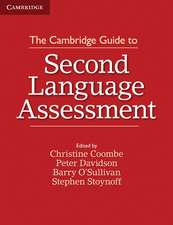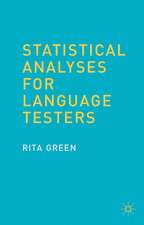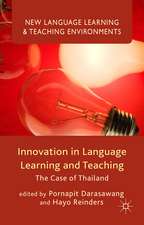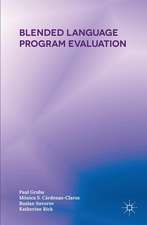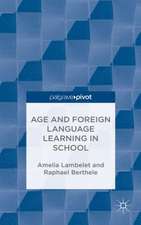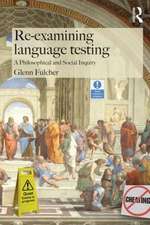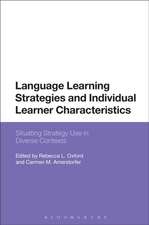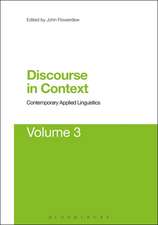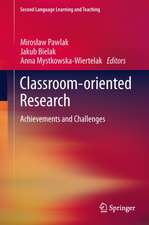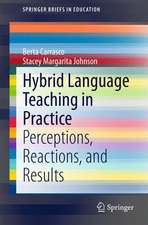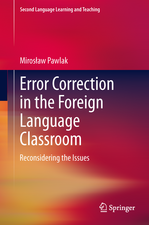Evaluation in Foreign Language Education in the Middle East and North Africa: Second Language Learning and Teaching
Editat de Sahbi Hidri, Christine Coombeen Limba Engleză Hardback – 7 oct 2016
The book highlights the impact of evaluation on a range of stakeholders, arguing that it has repercussions at the individual, societal, economic, cultural and political levels, that it also has an ethical dimension, and that it is tailored to people’s needs, helping them to remain abreast of the effectiveness and efficiency of programs.
Further, the book explores controversial issues concerning different evaluation themes, such as teacher and staff evaluation, assessment practices, text genre analysis evaluation, assessment of productive skills, textbook and ICT evaluation, evaluation of ELT certificates and programs, quality assurance, ESP needs analysis, assessmentliteracy, and dynamic assessment. It addresses key challenges, such as who the “right people” to implement evaluation are, and the appropriate use of evaluation results to avoid any misuse or harm to any stakeholder. In closing, the book calls for further research venues on the relevance of evaluation, testing and assessment in the MENA context and beyond.
| Toate formatele și edițiile | Preț | Express |
|---|---|---|
| Paperback (1) | 643.48 lei 6-8 săpt. | |
| Springer International Publishing – 22 apr 2018 | 643.48 lei 6-8 săpt. | |
| Hardback (1) | 649.87 lei 6-8 săpt. | |
| Springer International Publishing – 7 oct 2016 | 649.87 lei 6-8 săpt. |
Din seria Second Language Learning and Teaching
- 9%
 Preț: 627.98 lei
Preț: 627.98 lei - 15%
 Preț: 640.55 lei
Preț: 640.55 lei - 15%
 Preț: 645.47 lei
Preț: 645.47 lei - 15%
 Preț: 647.27 lei
Preț: 647.27 lei - 18%
 Preț: 965.34 lei
Preț: 965.34 lei - 15%
 Preț: 646.11 lei
Preț: 646.11 lei - 15%
 Preț: 647.08 lei
Preț: 647.08 lei - 15%
 Preț: 650.04 lei
Preț: 650.04 lei - 15%
 Preț: 645.60 lei
Preț: 645.60 lei - 15%
 Preț: 645.79 lei
Preț: 645.79 lei - 15%
 Preț: 643.34 lei
Preț: 643.34 lei - 15%
 Preț: 642.83 lei
Preț: 642.83 lei -
 Preț: 377.24 lei
Preț: 377.24 lei - 15%
 Preț: 638.76 lei
Preț: 638.76 lei - 24%
 Preț: 777.90 lei
Preț: 777.90 lei - 15%
 Preț: 645.47 lei
Preț: 645.47 lei - 15%
 Preț: 638.43 lei
Preț: 638.43 lei - 18%
 Preț: 736.01 lei
Preț: 736.01 lei - 18%
 Preț: 947.67 lei
Preț: 947.67 lei -
 Preț: 391.79 lei
Preț: 391.79 lei - 15%
 Preț: 642.51 lei
Preț: 642.51 lei -
 Preț: 377.24 lei
Preț: 377.24 lei - 20%
 Preț: 570.42 lei
Preț: 570.42 lei -
 Preț: 395.09 lei
Preț: 395.09 lei -
 Preț: 391.02 lei
Preț: 391.02 lei - 15%
 Preț: 647.27 lei
Preț: 647.27 lei - 20%
 Preț: 565.89 lei
Preț: 565.89 lei -
 Preț: 394.51 lei
Preț: 394.51 lei -
 Preț: 388.52 lei
Preț: 388.52 lei - 15%
 Preț: 646.62 lei
Preț: 646.62 lei - 18%
 Preț: 900.49 lei
Preț: 900.49 lei - 15%
 Preț: 638.43 lei
Preț: 638.43 lei - 15%
 Preț: 644.95 lei
Preț: 644.95 lei -
 Preț: 391.61 lei
Preț: 391.61 lei - 15%
 Preț: 641.20 lei
Preț: 641.20 lei - 15%
 Preț: 645.79 lei
Preț: 645.79 lei
Preț: 649.87 lei
Preț vechi: 764.55 lei
-15% Nou
Puncte Express: 975
Preț estimativ în valută:
124.37€ • 135.04$ • 104.47£
124.37€ • 135.04$ • 104.47£
Carte tipărită la comandă
Livrare economică 22 aprilie-06 mai
Preluare comenzi: 021 569.72.76
Specificații
ISBN-13: 9783319432335
ISBN-10: 3319432338
Pagini: 443
Ilustrații: XXII, 337 p. 28 illus., 18 illus. in color.
Dimensiuni: 155 x 235 x 21 mm
Greutate: 0.68 kg
Ediția:1st ed. 2017
Editura: Springer International Publishing
Colecția Springer
Seria Second Language Learning and Teaching
Locul publicării:Cham, Switzerland
ISBN-10: 3319432338
Pagini: 443
Ilustrații: XXII, 337 p. 28 illus., 18 illus. in color.
Dimensiuni: 155 x 235 x 21 mm
Greutate: 0.68 kg
Ediția:1st ed. 2017
Editura: Springer International Publishing
Colecția Springer
Seria Second Language Learning and Teaching
Locul publicării:Cham, Switzerland
Cuprins
Teacher Evaluation: What Counts as an Effective Teacher?.- EFL Teacher Evaluation: A Theoretical Perspective.- Faculty Performance Evaluation and Appraisal: A Case from Syria.- Ethicality in EFL Assessment: Bridging the Gap Between Theory and Practice.- Problematizing Teachers’ Exclusion from Designing Exit Tests.- The Voice of Classroom Achievement Toward Native and Non-native Educators in ELT: An Evaluative Study.
Textul de pe ultima copertă
This book presents evaluation cases from the Middle East and North Africa (MENA) context, investigating the various facets of evaluation in different parts of the MENA region and beyond. In 19 chapters, it explores cases from Tunisia, Saudi Arabia, Egypt, Sudan, Syria, the UAE, Turkey, Iran and Morocco.
The book highlights the impact of evaluation on a range of stakeholders, arguing that it has repercussions at the individual, societal, economic, cultural and political levels, that it also has an ethical dimension, and that it is tailored to people’s needs, helping them to remain abreast of the effectiveness and efficiency of programs.
Further, the book explores controversial issues concerning different evaluation themes, such as teacher and staff evaluation, assessment practices, text genre analysis evaluation, assessment of productive skills, textbook and ICT evaluation, evaluation of ELT certificates and programs, quality assurance, ESP needs analysis, assessment literacy, and dynamic assessment. It addresses key challenges, such as who the “right people” to implement evaluation are, and the appropriate use of evaluation results to avoid any misuse or harm to any stakeholder. In closing, the book calls for further research venues on the relevance of evaluation, testing and assessment in the MENA context and beyond.
The book highlights the impact of evaluation on a range of stakeholders, arguing that it has repercussions at the individual, societal, economic, cultural and political levels, that it also has an ethical dimension, and that it is tailored to people’s needs, helping them to remain abreast of the effectiveness and efficiency of programs.
Further, the book explores controversial issues concerning different evaluation themes, such as teacher and staff evaluation, assessment practices, text genre analysis evaluation, assessment of productive skills, textbook and ICT evaluation, evaluation of ELT certificates and programs, quality assurance, ESP needs analysis, assessment literacy, and dynamic assessment. It addresses key challenges, such as who the “right people” to implement evaluation are, and the appropriate use of evaluation results to avoid any misuse or harm to any stakeholder. In closing, the book calls for further research venues on the relevance of evaluation, testing and assessment in the MENA context and beyond.
Caracteristici
Investigates and presents an overview of the status quo of assessment, evaluation, and testing in different countries Addresses evaluation, assessment, and testing in the MENA context Paves the way for future studies on evaluation in this context Includes supplementary material: sn.pub/extras




